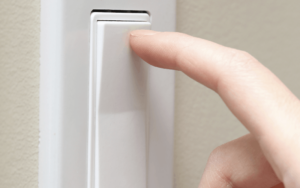My Electric Water Heater Has A Burning Smell
Has your electric water heater stopped working and started smelling like it’s burning?
Not only is it inconvenient to take cold showers, but your household members might start experiencing headaches or nausea due to the smell of rotten eggs or burning plastic.
That burning odor coming from your water heater is usually an indicator that one of its components is overheating or breaking down.
In this article, we’ll cover the three common causes for the foul water heater odor, including:
- Corroded Anode Rod
- High Amounts of Hydrogen Sulfide
- Damaged Electrical Elements
We’ll review the cause of those “burning” odors in more detail below and what you should do to remedy the problem and also prevent potential fire risks.
Need immediate help with your electric water heater problem?
Don’t hesitate to contact the plumbing experts at Climate Design. We can repair your water heater, no matter the brand, on the same day. We serve our Clearwater customers all week long, from 8am to 8pm. You can call us at (727) 295-1572 or click the button below for a free plumbing inspection.
Corroded Anode Rod
Replace your water heater’s corroded anode rod with a new one.
Are you smelling a rotten egg or sulfur odor? Your electric water heater might need an anode rod replacement.
All tank water heaters have a component called the anode rod, also referred to as the “sacrificial anode rod.” Its job is to “attract” and retain corrosion that’s caused by constant contact with water, saving the metal lining of your water heater tank from costly corrosion.
As the name suggests, the sacrificial anode rod needs frequent replacement. The durability of an anode rod depends on the material it’s made of and the level of hardness in the water it’s exposed to. With Florida’s high hard water levels, magnesium anode rods tend to corrode quickly, so you’re better off switching to a rod made of aluminum or zinc—materials that will last longer. A corroded tank lining can be an expensive repair. So, replacing the anode rod is your best preventative solution. And you can also say goodbye to that “burning” smell.
Solution:
Call a professional plumber to check the material of your current anode rod and find out if you need to replace it.
High Amounts of Hydrogen Sulfide
Hydrogen sulfide in your water heater can lead to those “burning” smells. How does this occur?
With its characteristically foul-smelling odor, sulfur turns into sulfate compounds when it’s in a high-oxygen environment like tap water. These compounds are not a problem in this case, because they are insoluble and cannot dissolve in water.
The problem occurs when naturally sulfate-rich water, like Florida’s, moves into a low-oxygen environment like a water heater. Sulfur-reducing bacteria thrive in low-oxygen environments, and they turn sulfate compounds into hydrogen sulfide, a gas that can dissolve in water.
If the burning smell from your water heater has a distinct sulfur scent to it, you may have bacteria growing in the tank that is chemically changing sulfates into hydrogen sulfide. Hydrogen sulfide can give water that “rotten egg” odor and also corrodes a water heater. It’s also possible that the water heater’s anode rod is chemically changing sulfates into hydrogen sulfide.
Solution:
Get rid of sulfur-reducing bacteria in your water heater by adjusting the water temperature.
The best way to reduce high amounts of hydrogen sulfide in your water heater is to eliminate the sulfur-reducing bacteria in the tank by draining and flushing it. Follow the steps listed below to flush your tank:
- Turn off the water heater to allow for safe and proper drainage, and then drain its tank
- Increase the water temperature to above 140°F and refill the tank
- Keep the temperature at that temperature for 6-10 hours
- Turn off the water heater and return the temperature to normal
- Drain the water and refill again
If the odor does not go away, you should call a plumber to flush and disinfect the inside of the tank and replace the anode rod as well.
Damaged Electrical Elements
Call a licensed plumber to resolve electrical problems with your water heater.
Do you smell an “electrical” burning odor from your water heater? If you do, its electrical elements might be overheating. The two major electrical elements a plumber should check include:
- Faulty electrical wiring
- Overheating electrical contacts
If you suspect either of these issues is the cause, you should shut off the breakers that supply power to your water heater and call a licensed plumber for help. Damaged electrical elements are a safety hazard and should only be handled by qualified professionals.
Faulty Electrical Wiring:
Loose wiring in electrical water heaters can “short,” meaning its electrical currents take a path that they aren’t meant to take. Shorts generate heat, melting the insulative covers on the wires and causing a burning plastic or rubber smell.
Also, when the insulative covers melt off, the wiring can touch other heating elements in the water heater, causing the exposed wiring to start burning.
Solution:
A professional should be called to replace the wiring and insulative covers.
Overheating Electrical Contacts:
A plastic or “burning rubber” smell could also indicate that the electrical contact switches mounted outside the water heater are broken. When the contacts wear out over time, their wiring begins to discharge continuously. As a result, those connections start generating heat, melting plastic parts in the water heater.
Solution:
Call a professional to replace any broken contacts or electrical connections so that your water heater can continue to safely operate. Depending on the severity of electrical damage, you may need to replace the entire water heater.
Accumulated Dust
Use a sponge or cloth to wipe down your electric water heater’s surface.
Depending on where in your home your water heater is located, it may accumulate dust and dirt on its surface over time. In some cases, the warm surface of the unit may even begin to burn off the dust accumulation, causing an odor.
Solution:
Check the water heater to see if it has a buildup of dust. If that’s the case, wipe it down with a damp cloth or sponge. After a few days, the smell should ease up. Call a professional plumber if cleaning the water heater hasn’t resolved your burning smell issue.
Call Climate Design; we’ll get rid of that burning smell.
Climate Design’s highly experienced plumbers can assist you with your electric water heater repair every day of the week, from 8am to 8pm. We provide same-day service on all water heater brands and models. Plus, our service vans are always fully stocked so that our plumbers can resolve your issue within hours.
Give us a call at (727) 295-1572 or book your free plumbing inspection below to experience 5-star service.
You May Also Like

Why AC Tuneups Are So Beneficial to Your Comfort and Wallet
Living in Sarasota, FL, means embracing the sunshine and heat. It also means relying heavily on your air conditioner to stay comfortable.… Continue Reading Why AC Tuneups Are So Beneficial to Your Comfort and Wallet…

The Hidden Dangers of Ignoring a Shower Leak in Largo, FL
A shower leak is the last thing you want when you bathe in the morning to get you going or in the… Continue Reading The Hidden Dangers of Ignoring a Shower Leak in Largo, FL…

5 Tips for Preventing Electrical Accidents & Injuries
Electricity is ubiquitous in our day-to-day lives, making it easy to forget just how dangerous it can be. Household electrical accidents &… Continue Reading 5 Tips for Preventing Electrical Accidents & Injuries…

